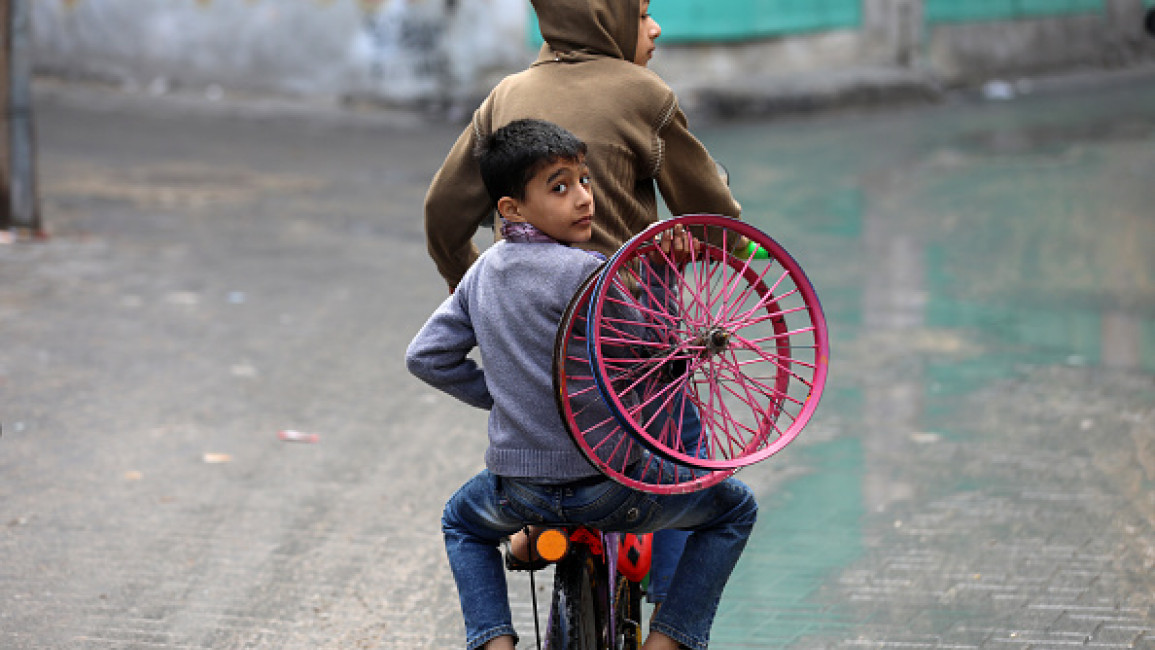This winter season, suffering of needy families doubles in Gaza
For needy families in the besieged and impoverished coastal enclave of the Gaza Strip, the winter season is a new gate for their endless their suffer as they lack appropriate heating methods, as well as enough food.
Recently, the Gaza Strip has been subjected to heavy rains for days and flooding.
As a result, many houses owned by poor families were negatively impacted by the weather as dozens of streets and low-lying areas were flooded.
"Such a situation can stop our life completely," Samaher al-Haj Ali, a woman based in Gaza, spoke to The New Arab. "No one of my family can leave the house … and no one can stay in a warm place, which means that we have to confront our problem alone."
The 42-year-old woman lives with her eight-member family in a small house, built with iron walls, which has many holes that allow the rain to pour in.
"The three-month winter season increases the burden on us, not only because of my 'unhealthy' house but also because my husband may lose his work in the public markets during the heavy raining days," she said.
"We do not have any means that would help us pass this season without losses … and the local authorities do not care about our suffering or even try to help us protect our houses before arriving the rains by repairing our walls and providing some food for our children," she added.
The situation is no better for Mohammed al-Aqqad, based in Dir al-Balah, who found himself with his eight-member family stuck amid floods by the rain and could not leave his house for hours.
"For more than 15 years, we have been forced to witness such a tragic situation in the winter season, as the Israeli occupation used to open the ferries and rainwater channels falling on the lands of the occupied interior towards the Gaza Strip," the 55-year-old father said to TNA.
"We live in a real catastrophic in Gaza as we have to challenge all the obstacles and life burdens alone without having any help from anyone," he stressed. "All the Palestinian officials, in Gaza and West Bank, must bear their responsibilities towards us (the needy families)."
Al-Aqqad was one of the dozens of families hit by the torrential torrents of water which uprooted their homes and swept away everything in their path.
About 64 per cent of the population in Gaza is in poverty, with 33 per cent of the population in extreme poverty and 57 per cent experiencing food insecurity, according to official statistics issued by the Palestinian Central Bureau of Statistics (PCBS).
Since 2007, the Palestinians in Gaza suffer from extremely difficult living conditions due to the Israeli-imposed blockade on the coastal enclave after Hamas, which won the legislative elections, seized the territory from Fatah.
Moreover, the Israeli army launched five large-scale wars and dozens of shorter military raids against the Palestinians in Gaza, which left thousands dead and destroyed thousands of residential, industrial and government buildings.
In 2012, the United Nations said in its annual report that the Gaza Strip will be "unlivable" if the Israeli blockade persists. Since then, the UN repeatedly warned of the sharp deterioration of living conditions in the Gaza Strip.
Zuhdi al-Ghuriz, the head of the Hamas-run government emergency committee in Gaza, told TNA that "the Israeli wars left the coastal enclave to suffer a lot as the huge destruction hit most of the buildings and infrastructure."
As a result, he says, the municipalities need specialised mechanisms and projects to keep pace with the climate change facing the entire world.
"Gaza is under a strict blockade, which has led to the cessation of infrastructure projects that keep pace with the development of rainwater collection and drainage methods," he explained, calling for the speedy supply of the Gaza Strip with the necessary equipment to confront the climate change that is striking across the world.



